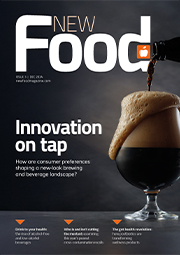Mycotoxins: invisible and insidious foodborne toxicants
- Like
- Digg
- Del
- Tumblr
- VKontakte
- Buffer
- Love This
- Odnoklassniki
- Meneame
- Blogger
- Amazon
- Yahoo Mail
- Gmail
- AOL
- Newsvine
- HackerNews
- Evernote
- MySpace
- Mail.ru
- Viadeo
- Line
- Comments
- Yummly
- SMS
- Viber
- Telegram
- Subscribe
- Skype
- Facebook Messenger
- Kakao
- LiveJournal
- Yammer
- Edgar
- Fintel
- Mix
- Instapaper
- Copy Link
Posted: 23 February 2018 | Ahmad Alshannaq - University of Wisconsin-Madison, Jae-Hyuk Yu - University of Wisconsin-Madison | No comments yet
Mycotoxins are small molecular weight fungal toxins that contaminate over 25% of the global food supply, leading to annual losses of around 1.0 billion tons of food and food products. Ahmad Alshannaq and Jae-Hyuk Yu, of the University of Wisconsin-Madison, consider which foods are most susceptible to contamination and the best analytical methods.


Foods are life’s artery, providing essential nutrients and energy to people and animals. A major challenge facing the world is keeping the food supply safe and sustainable. Food safety is a complex issue that involves all segments of society: public, government, industry, and academia. Mycotoxins are an often underappreciated threat to food safety.
Mycotoxins are toxic secondary metabolites produced by filamentous fungi (moulds) belonging to three main genera: Aspergillus, Fusarium and Penicillium. These fungi can grow on crops and some fruit and vegetables in fields, and can infest food and feed during processing, distribution, and storage. When moulds grow in foods, they often produce mycotoxins. While over 300 mycotoxins have been identified, seven frequently contaminate food and feed, and are subject to regular monitoring and regulations for about 120 countries. These are aflatoxins (AFs), ochratoxin A (OTA), fumonisin B1 (FB1), deoxynivalenol (DON), trichothecene (T-2), zearalenone (ZEN), and patulin.
The rest of this content is restricted - login or subscribe free to access


Why subscribe? Join our growing community of thousands of industry professionals and gain access to:
- bi-monthly issues in print and/or digital format
- case studies, whitepapers, webinars and industry-leading content
- breaking news and features
- our extensive online archive of thousands of articles and years of past issues
- ...And it's all free!
Click here to Subscribe today Login here




